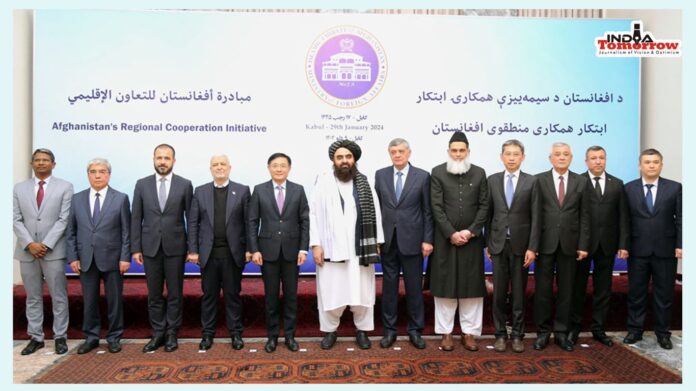By Our Correspondent
NEW DELHI—A conclave organised by the ruling Taliban in Afghanistan’s capital Kabul recently, attended by India and 10 other countries, has paved the way for a broader regional cooperation and international recognition, which in turn will facilitate the resumption of global aid to the war-torn country. Taliban had returned to power in Afghanistan in 2021, twenty years after their ouster by the United States Armed Forces.
Taliban regime’s acting Foreign Minister Amir Khan Muttaki called upon the participating countries to utilise the opportunities in Afghanistan and manage the potential threats. The outcome of the conclave may help end the prolonged period of isolation of Taliban and ensure the welfare of Afghan people with the resumption of international aid.
India has not yet recognised the Taliban government and has been pitching for the formation of a truly inclusive government in Kabul. There was no official word on the meeting from the Ministry of External Affairs. Besides India, the other participating countries were Kazakhstan, Turkey, Russia, China, Iran, Pakistan, Uzbekistan, Turkmenistan, Indonesia and Kyrgyzstan.
The regional cooperation Initiative meeting was addressed mainly by Muttaqi. A statement from the Taliban Foreign Ministry said that Muttaqi emphasised that these nations should hold regional dialogues to increase and continue the positive interaction with Afghanistan. India’s participation in the conclave came days after the Indian Embassy in the United Arab Emirates (UAE) invited the charge d’affaires of the Afghan Mission in the Gulf nation, Badruddin Haqqani, to the Republic Day celebrations in Abu Dhabi.
The invite was sent to all accredited Missions based in UAE and was part of standard diplomatic procedure. In his remarks, Muttaqi urged the participants to take advantage of emerging opportunities in Afghanistan for the development of the region and coordinate the management of potential threats.
He said regional cooperation could be focused on exploring region-centric pathways based on common benefits.
Muttaqi said the regional cooperation should lead to calls for removal of unilateral sanctions on Afghanistan. Kabul stood ready to engage and cooperate with the regional countries by working together based on mutual interest and mutual respect, he affirmed.
India re-established its diplomatic presence in Kabul in June 2022 by deploying a technical team in its Embassy in the Afghanistan capital. India had withdrawn its officials from the Embassy after the Taliban seized power following concerns over their security.
No country has so far recognised the Taliban as the legitimate government of Afghanistan. However, China has kept its Embassy open in Afghanistan and has accredited Taliban diplomats. In September 2023, China became the first country to name a new Ambassador to Afghanistan since the Taliban took over the country in 2021. China allows its Embassy to operate in the country and negotiates issues of trade, investment, and aid with the Taliban government.
The Taliban regime has been making attempts to get international recognition. It may not happen at an official diplomatic level in the short term, but there seems to be a clear trend towards this direction. The growing number of countries are reducing restrictions on contacts with the Taliban and deepening the ties with the leaders of the unrecognised Islamic Emirate of Afghanistan.
The U.S. is cautiously exploring the possibility of reopening a Consulate in Afghanistan. The U.S. Embassy in Kabul was closed abruptly in August 2021 due to the rapid withdrawal of American soldiers from Afghanistan. Since then, the U.S. Embassy in Afghanistan has been operating from Doha, and its consular services are also available in neighbouring countries.
However, Thomas West, the U.S. special envoy for Afghanistan, has previously stated that Washington is the primary and biggest humanitarian supporter for Afghanistan. The U.S. has officially stated that after the Taliban takeover, Afghanistan suffers under an extreme form of religious authoritarianism that uses military force and its secret police as governance instruments of choice. As the people in Afghanistan are starving, they are also prone to radicalisation.
The Taliban leaders have repeatedly stated that they have no intention of implementing any reforms which contradict “Afghan traditions and norms of Islam”. At the same time, almost all major powers and regional players demand serious reforms, an inclusive government, and regime liberalisation from the Taliban. The western countries are making efforts to lead the Taliban towards a more liberal and tolerant regime.
According to the political observers in South Asia, a comprehensive strategy is needed to normalise the situation in Afghanistan. It should include the willingness and desire to engage in dialogue with the Taliban, especially those factions which are committed to a dialogue with the outside world and seek international recognition. As for the most conservative groups and their sponsors, pressure needs to be exerted on them, which will imply solid rewards for transforming their strategies.
Taliban has affirmed that it wants a genuine Islamic system for Afghanistan and to build an “open and inclusive” Islamic government with the promises to make provisions for women’s and minority rights in line with cultural traditions and religious rules. It goes without saying that since Taliban are firmly entrenched as the rulers of Afghanistan with no significant opposition which could topple them, the western world needs a more constructive approach to deal with them with a farsightedness.





